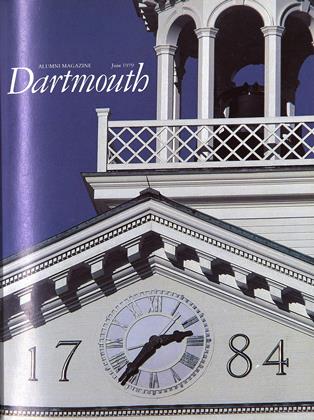Barring intervention of slip twixt cup and lip, the Medical School will revert to the traditional four-year curriculum, beginning with the class due to enter in the fall of 1980.
The faculty has approved the change by a vote of 92 to 1; Mary Hitchcock Memorial Hospital and the Hitchcock Clinic, as well as the Veterans Hospital in White River Junction, have endorsed it from the standpoint of clinical resources; a committee representing jointly the Association of American Medical Colleges and the American Medical Association indicated following a week-long visit last month that they would recommend the proposed program for accreditation. All that remains is the official approval of the primary accrediting body.
Yet to be decided — but possibly by late summer — is whether class size will be increased, a move also recommended last year by a faculty committee. Expansion of class size is inextricably bound to a parallel expansion of clinical facilities at some offcampus site. Several locations have been investigated in recent months. The timing of a decision, says Dr. Philip Nice, associate dean for academic and student affairs at the Medical School, will put admissions in "something of a bind," since they may well already be interviewing students for the class of 1984 before they know how large that class may actually be.
Even the changeover from three years to four,.he adds, could have some effect on admissions, since some applicants are specifically seeking a three-year program.
That form of telescoped medical education already has become a comparative rarity. If neither fad nor phase, the threeyear curriculum was evidently an idea whose time might better not have cdme. Most Dartmouth medical faculty, as indicated by their vote, object to a pressure and a pace that leave students too little time for reflection and assimilation. In 1973, when Dartmouth graduated its first crop of M.D.s since 1914, 27 per cent of the nation's medical schools were on a threeyear program. When, presumably, Dartmouth abandons it, only six per cent will be left with the shortened schedule.
Whereas other evolutionary changes at the Medical School are still in abeyance, one is already accomplished. Meeting in April, the College Trustees approved a whopping 27 per cent increase in tuition to $9,500. While the cost of a Dartmouth medical education is not expected to take such great leaps forward in the future, Dr. Nice says that the jump was necessitated this year by the loss of "capitation" funds — sums paid directly to medical schools by the federal government, for each student enrolled. Designed to encourage the training of more medical students, the funds have been discontinued because the government has recently decided that the primary problem after all is not supply but distribution of physicians.
In place of capitation, the government now offers, on a competitive basis, a limited (and declining) number of full scholarships to students who sign up for the National Health Service Corps, committing themselves to practice in underserved areas after graduation. Of Dartmouth students, 30 per cent are studying under government subsidies, 25 per cent with the National Health Service Corps, the remainder under similar arrangements with armed forces programs.
Under the new calendar, according to Dean James C. Strickler '50, the first year will be concentrated chiefly on basic medical sciences, as it is during what is currently known as Phase I. Year two will be much akin to Phase II, with its primary focus on the interdisciplinary course "The Scientific Basis of Medicine." The third will be a clinical year, and the fourth will include a primary care clerkship, two new courses - "Health" and "Society and Therapeutics" - and 25 weeks of electives plus vacation. (All students now enrolled or entering this year will complete the program into which they matriculated.)
Actually, as Strickler points out, the number of weeks of instruction will in. crease only from 132 to 150. But the new calendar "will allow for substantial decompression, will enable students to spend more time on difficult subject material, and will expand the elective opportunities," he notes. "It will also provide for vacation." And, with a calendar closely paralleling that of the College, it will increase the "opportunities for the exchange of students and faculty between the Medical School, the College, Tuck, and Thayer" — a broadening always envisioned but heretofore, for practical reasons, rarely realized.
Dr. Philip Nice: helping steer a courseback to the four-year medical curriculum.
 View Full Issue
View Full Issue
More From This Issue
-
 Feature
Feature'We will all make whoopee'
June 1979 By Dick Holbrook -
 Feature
FeatureE – i – e – i – o
June 1979 By Marshall Ledger -
 Feature
FeatureExit with a Flourish
June 1979 By Beverly Foster -
 Feature
FeatureEncouraging growth, affirming the educational process
June 1979 By Robert Kilmarx -
 Article
ArticleCommencement
June 1979 By James L. Farley -
 Article
Article'Radical' with a Cause
June 1979 By Tim Taylor








